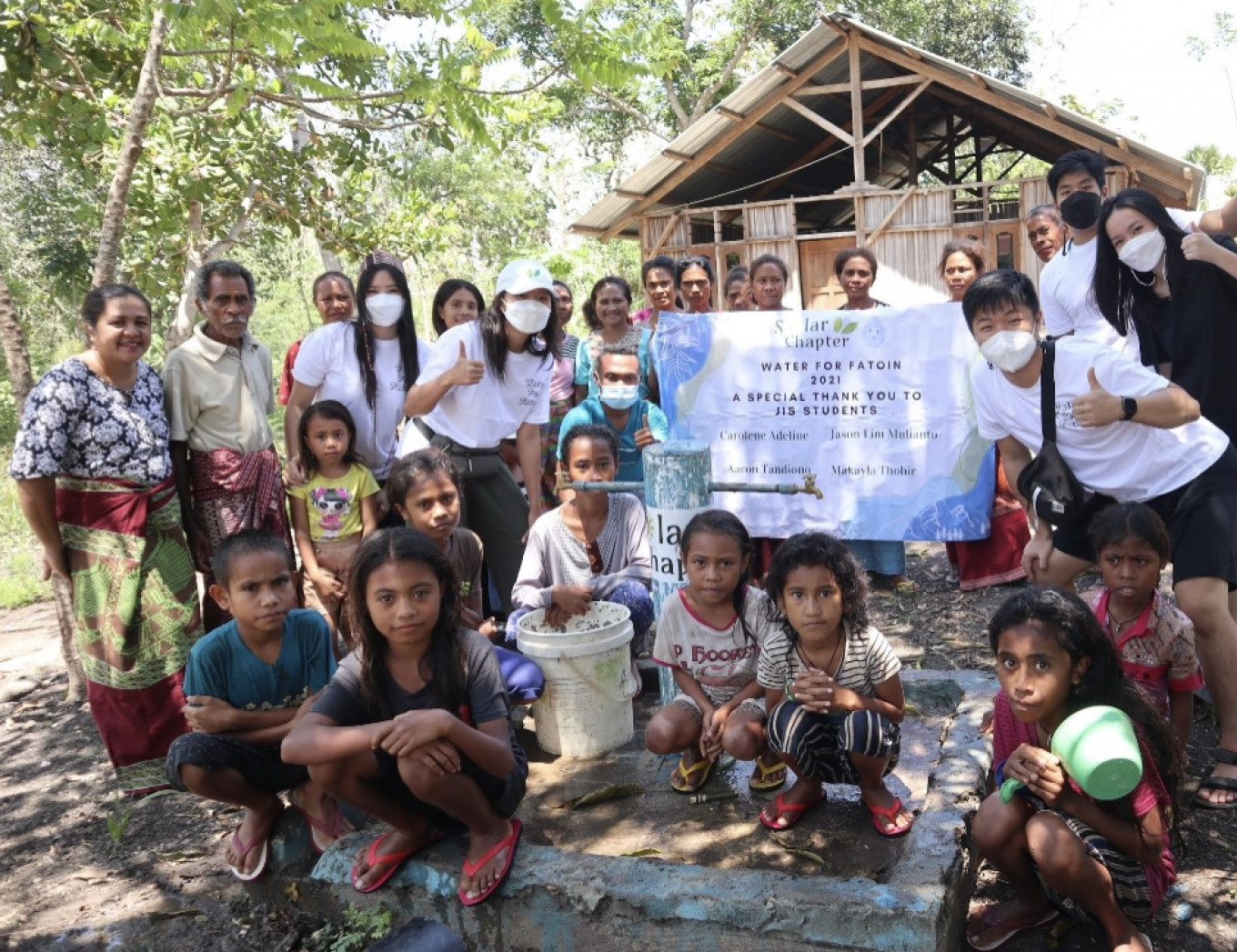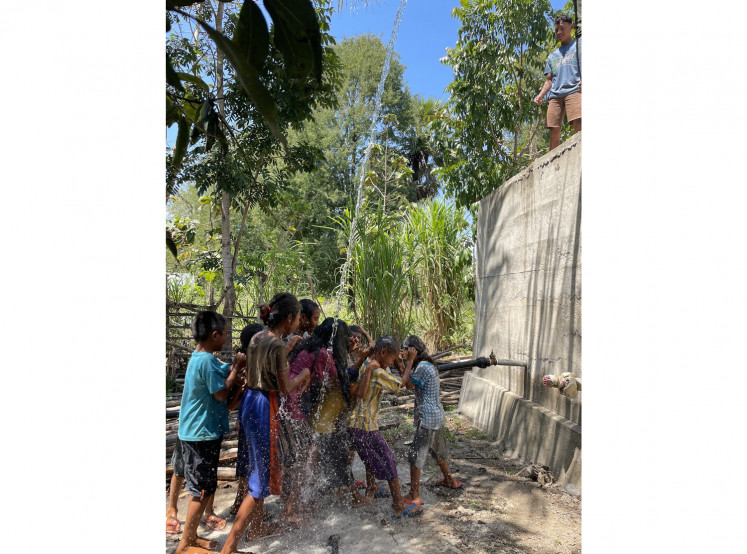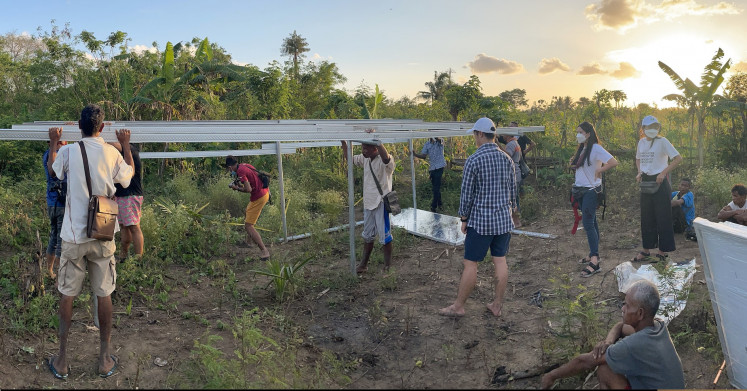Popular Reads
Top Results
Can't find what you're looking for?
View all search resultsPopular Reads
Top Results
Can't find what you're looking for?
View all search resultsJIS students install water pipes, solar panels in remote NTT village
During a family visit to East Nusa Tenggara (NTT) in the summer of 2019, I had the opportunity to volunteer at a mobile clinic that allowed me to see firsthand the urgent need for clean water in remote parts of Indonesia.
Change text size
Gift Premium Articles
to Anyone
D
uring a family visit to East Nusa Tenggara (NTT) in the summer of 2019, I had the opportunity to volunteer at a mobile clinic that allowed me to see firsthand the urgent need for clean water in remote parts of Indonesia. I learned a great deal from the experience, which also opened my eyes to just how prevalent the lack of clean water access is in the country.
I spoke about my discovery with three like-minded classmates from Jakarta Intercultural School (JIS), Jason, Aaron and Makayla, and we decided that we wanted to help in any way possible.
Coincidentally, I was already involved in a different fundraising project for NTT for flood relief, during which I got to know Mustika, the president and founder of Solar Chapter, a non-profit organization focused on developing remote areas. After a meeting with our team and several other Solar Chapter members, we found out that we were both passionate about the same issue.
Solar Chapter was founded to provide clean and accessible water to the less fortunate. Many people living in remote villages have to walk between 1.5 and 6 kilometers across uneven roads to reach a water source. Because our goals matched, we decided to collaborate with Solar Chapter for the Water for Fatoin project.
Fatoin village in NTT has approximately 800 residents spread across several hamlets, most of whom work as farmers and graziers. Unfortunately, those who rely on agriculture and livestock for their source of income do not have access to clean water for their daily needs, let alone water for farming. In addition to not having a water pump and clean water, the village also lacks a sufficient electricity supply. So, we decided to utilize solar panels, as the sun would be an adequate and renewable energy source that could produce enough electricity for the water pump we plan to provide.
To begin the project, the JIS team of four students and the Solar Chapter team drafted a proposal and a budget. Solar Chapter, having done many similar projects, prepared a working budget of approximately Rp 320 million (US$22,527). Fortunately, through sponsorships and donations, we were able to meet our target.
Once funding was secured, we started looking for vendors to supply the pipes and solar panels. After coming to an agreement with the vendors, the pipes, the pump and the solar panels we needed were shipped to Fatoin. Now, all we had to do was wait until it was safe to travel.
Representing the JIS team, I joined several members of Solar Chapter and traveled to Fatoin village on Sept. 22 for an implementation visit.
Prior to the trip, we had been in communication with the villagers, who had agreed to begin preparations for the project. The villagers had been asked to build a reservoir where the pump would later be installed and to install several public taps around the community. Upon arrival, the villagers couldn’t wait to show us what they had accomplished. The next step was to install the solar panels and pump and to connect the pipes from the reservoir to the taps.
On the first day, we focused on installing the solar panels. Simultaneously, with the help of the villagers, another team started unwinding the pipes and stretching them across the paths where they would be placed the next day. We finished working at around 7.30 p.m. when it became too dark for us to continue.
Jakarta Intercultural School students, members of Solar Chapter and residents of Fatoin village in East Nusa Tenggara work together to install metal frames for solar panelsThe next day, all we had to do was finish connecting the pipes and setting up the pump. We split into two teams; one team was in charge of overlooking the pipes’ distribution, and another team went to the reservoir and connected the pump to be powered by the solar panels.
With the help of the villagers, who wholeheartedly participated in the building of the water system from the beginning to the end, we were able to complete the water system. On our second day in Fatoin, we had water running by lunchtime.
Once the children of the village heard about the running water, they all ran to the biggest tap located in the house of the Fatoin community head. Their pure excitement of taking a shower without having to traverse across bumpy roads to a water source made all of our hard work worthwhile. We left with full hearts and expressions of thanks and gratitude from the villagers ringing in our ears.
“Thank you so much, JIS and Solar Chapter, for giving us the opportunity to have clean and accessible water. We really appreciate your help!” they told us.
We believe that success has nothing to do with what you accomplish for yourself; it’s what you do for others. As Indonesians, we are proud to have helped the villagers of Fatoin gain access to clean water. Beyond being Indonesians, we are citizens of the world. We look forward to making a positive difference in the lives of others anywhere we find the opportunity. As JIS students who are heading to university, we know we will be taking this newfound feeling of affecting change to look for further opportunities to help communities in need.
Carolene Adeline is a Grade 12 student at Jakarta Intercultural School












